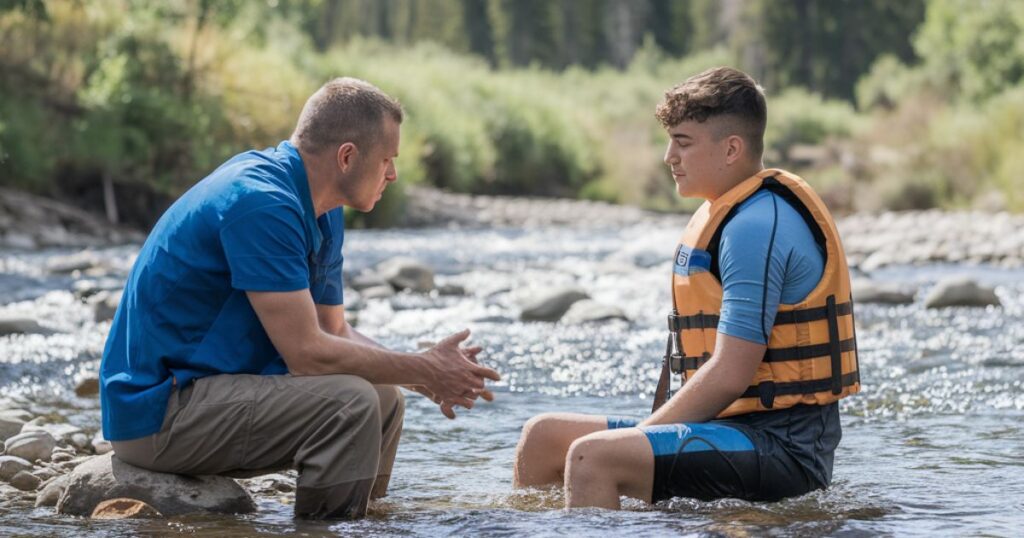In recent years, the wilderness therapy industry has faced increasing scrutiny, with Trails Carolina at the center of a storm of controversy.
This in-depth exploration delves into the troubling allegations surrounding Trails Carolina, examining the program’s history, the rise of horror stories, and the critical need for ensuring safety in wilderness therapy programs.
As we navigate this complex landscape, we’ll uncover the challenges faced by troubled youth, their families, and the institutions designed to help them.
The Genesis of Trails Carolina
Trails Carolina emerged as a beacon of hope for families grappling with troubled teens. Founded with the noble intention of providing therapeutic wilderness experiences, the program aimed to address a spectrum of adolescent issues, from behavioral problems to substance abuse.
Initially, Trails Carolina garnered praise for its innovative approach, combining the healing power of nature with structured therapy. The program’s early days were marked by success stories that painted a picture of transformation and renewal.
Parents reported significant improvements in their children’s behavior, self-esteem, and overall well-being. These positive outcomes fueled the program’s growth and reputation, attracting families desperate for solutions to their teens’ struggles.
“When we first heard about Trails Carolina, it seemed like the answer to our prayers,” recalls Sarah Thompson, mother of a former participant. “The promise of a fresh start in nature sounded perfect for our son.”
However, as time passed, the rosy picture began to crack, revealing a darker underbelly that would soon captivate public attention and spark intense debate about the ethics of wilderness therapy.
The Rise of Allegations
As Trails Carolina’s prominence grew, so did the whispers of discontent. What began as isolated incidents soon coalesced into a pattern of disturbing allegations. By 2017, the program found itself embroiled in controversy, with former participants and their families coming forward with harrowing tales of their experiences.
The allegations against Trails Carolina encompassed a wide range of issues:
- Physical Abuse: Claims of excessive force used during restraints and punitive exercises
- Emotional Trauma: Reports of humiliation, isolation, and psychological manipulation
- Neglect: Accusations of inadequate food, water, and medical care
- Unsafe Conditions: Descriptions of dangerous hiking routes and exposure to extreme weather
These horror stories, shared across social media platforms and support groups, painted a grim picture of life within the program. Former participants, like 18-year-old Jake Mendoza, spoke out about their experiences:
“I went in thinking I’d find help, but instead, I found myself fighting for survival,” Mendoza stated in a 2018 interview. “The physical challenges were brutal, but the emotional scars run even deeper.”
As these accounts proliferated, they caught the attention of investigative journalists and watchdog organizations. The allegations against Trails Carolina became part of a larger conversation about the oversight and regulation of wilderness therapy programs across the United States.
The Heartbreaking Case of Eric Galvan

Among the many troubling stories to emerge from Trails Carolina, none has been more impactful than the tragic case of Eric Galvan. In 2017, the 16-year-old’s life came to a devastating end while enrolled in the program, sending shockwaves through the wilderness therapy community and beyond.
Eric, described by family and friends as a sensitive and creative soul, had been struggling with depression and anxiety when his parents made the difficult decision to enroll him in Trails Carolina. They hoped the program would provide the structure and support Eric needed to overcome his challenges.
The circumstances surrounding Eric’s death remain controversial. Initial reports suggested he had wandered away from the group during a hike, but later investigations raised questions about the supervision and safety protocols in place.
The Galvan family’s quest for answers thrust Trails Carolina into the national spotlight, igniting a fierce debate about the risks inherent in wilderness therapy programs.
Eric’s mother, Maria Galvan, became a vocal advocate for reform in the wake of her son’s death. “No parent should have to endure this kind of loss,” she stated in a 2018 press conference. “We trusted Trails Carolina with our child’s life, and they failed us in the most devastating way possible.”
The Eric Galvan case served as a catalyst for change, prompting calls for increased oversight and stricter safety standards across the wilderness therapy industry.
Also Read This: Unlock the Future of Costco Stock with FintechZoom’s Latest Analysis: A Deep Dive
Trails Carolina’s Response to Allegations
In the face of mounting criticism and public outcry, Trails Carolina found itself on the defensive. The program’s response to the allegations, particularly in the wake of Eric Galvan’s death, has been a subject of intense scrutiny.
Initially, Trails Carolina issued statements expressing condolences to the Galvan family and pledging to conduct thorough internal investigations into all allegations of misconduct.
The program emphasized its commitment to safety and the well-being of its participants, pointing to its accreditation and years of successful outcomes.
However, critics argued that these responses fell short of addressing the systemic issues raised by former participants and their families. Transparency became a key point of contention, with many calling for more open communication about incidents, policies, and safety measures.
In an effort to rebuild trust, Trails Carolina announced several changes to its operations:
- Enhanced staff training on crisis intervention and de-escalation techniques
- Increased medical personnel on-site during wilderness expeditions
- Implementation of a more robust reporting system for incidents and concerns
- Regular third-party audits of safety protocols and program practices
Despite these measures, skepticism remained high among critics and concerned parties. Many argued that the changes were too little, too late, and called for more fundamental reforms to the program’s approach to wilderness therapy.
The Need for Scrutiny in Wilderness Therapy

The controversies surrounding Trails Carolina have highlighted the critical need for thorough scrutiny and oversight in the wilderness therapy industry. As more horror stories come to light, parents and advocates are calling for greater transparency and accountability from these programs.
When considering wilderness therapy for troubled youth, families should be aware of several red flags:
- Lack of accreditation from recognized organizations
- Limited or restricted communication between participants and their families
- Vague or evasive answers to questions about safety protocols
- High staff turnover rates
- Resistance to outside oversight or independent reviews
Industry experts emphasize the importance of comprehensive research before enrolling a child in any wilderness therapy program. Dr. Amanda Chen, a psychologist specializing in adolescent mental health, advises:
“Parents must look beyond the glossy brochures and testimonials. Ask tough questions about staff qualifications, emergency procedures, and the program’s track record. Don’t be afraid to request references and speak with families who have completed the program.”
State regulations play a crucial role in ensuring the safety of wilderness therapy participants. However, the level of oversight varies significantly from state to state, creating a patchwork of standards across the country. Advocates argue for more uniform, stringent regulations to protect vulnerable youth.
Towards a Safer Future for Troubled Youth
The Trails Carolina horror stories have served as a wake-up call for the entire wilderness therapy industry. As we look towards the future, several key areas emerge as priorities for creating safer, more effective programs:
- Transparency and Accountability: Programs must be open about their practices, incidents, and outcomes. Regular reporting to families and regulatory bodies should be mandatory.
- Evidence-Based Practices: Wilderness therapy programs should incorporate scientifically validated therapeutic techniques and continually evaluate their effectiveness.
- Improved Staff Training: Comprehensive training in crisis management, trauma-informed care, and adolescent psychology is essential for all staff members.
- Enhanced Medical Support: On-site medical professionals and clear protocols for handling health emergencies are crucial for participant safety.
- Family Involvement: Programs should foster open communication with families and involve them in the therapeutic process when appropriate.
- Aftercare and Follow-Up: Ongoing support for participants after they complete the program is vital for long-term success.
| Area of Improvement | Proposed Action |
| Transparency | Regular public reporting of incidents and outcomes |
| Staff Training | Mandatory certification in wilderness first aid and crisis intervention |
| Medical Support | 24/7 on-call physician and increased medical staff presence |
| Family Involvement | Weekly update calls and family therapy sessions |
| Aftercare | 6-month follow-up program with counseling support |
As the industry evolves, programs like Trails Carolina must adapt or face obsolescence. The future of wilderness therapy lies in balancing the potential benefits of nature-based interventions with rigorous safety standards and evidence-based practices.
Conclusion
The Trails Carolina horror stories and allegations have cast a long shadow over the wilderness therapy industry. From the tragic case of Eric Galvan to the numerous accounts of mistreatment and neglect, these incidents serve as a stark reminder of the vulnerabilities inherent in programs dealing with troubled youth.
As we move forward, it’s crucial to recognize both the potential benefits and risks of wilderness therapy. The allure of nature as a healing force remains powerful, but it must be harnessed responsibly and ethically.
Parents considering such programs for their children must approach the decision with caution, armed with knowledge and a critical eye.
The future of Trails Carolina and similar programs hinges on their ability to address these serious concerns head-on.
Transparency, accountability, and a genuine commitment to the safety and well-being of participants must be at the forefront of any reforms.
Ultimately, the goal remains the same: to provide troubled youth with the support and tools they need to overcome their challenges and thrive.
As we continue to unveil and address the shortcomings in the current system, we pave the way for a safer, more effective approach to helping our most vulnerable young people.
By learning from the Trails Carolina horror stories and working tirelessly to prevent such tragedies in the future, we can hope to create a landscape where wilderness therapy fulfills its promise of healing and transformation, without compromising the safety and dignity of those it aims to help.

